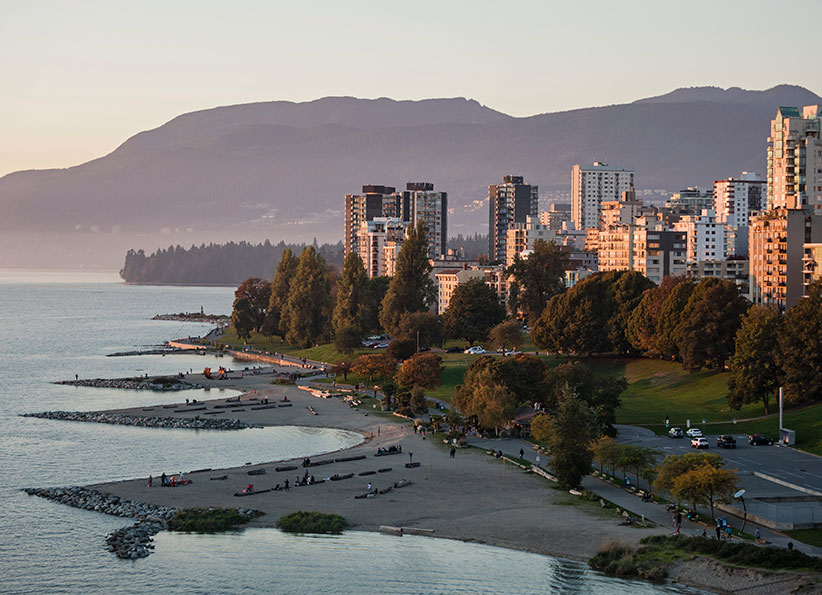A city in need of long-term vision
A new report says Vancouver faces big challenges in beating its global competitors
A scenic view at twilight of Sunset Beach on the West End’s waterfront, English Bay, Vancouver, B.C. (Bayne Stanley/CP)
Share

Vancouver’s strong economy and privileged location at the gateway to the Asia Pacific mask weaknesses that could blunt its long-term competitiveness, according to an ambitious new study.
The 2016 Greater Vancouver Economic Scorecard is the most detailed piece of public-policy work in two decades from the Greater Vancouver Board of Trade. Working with the Conference Board of Canada, the organization compared the Vancouver region against 20 international competitors — including Shanghai, Sydney, San Francisco, Toronto, Montreal, Halifax and others — on 32 economic and social indicators.
The report will be released Wednesday in Vancouver. The Greater Vancouver Board of Trade gave Maclean’s exclusive advance access.
The scorecard ranks cities on two composite scales—economy and social. Vancouver fares only middling-well on both scales—ninth on the economy, seventh on social—with a grade of “B” on both. Three Asian powerhouses, Singapore, Hong Kong and Shanghai, topped the economy ranking, while Barcelona, Copenhagen and Sydney were at the top of the social scale.
The report’s authors say Vancouver’s long-term performance will depend on the ability of local and regional governments to tackle seven big challenges. Inadequate roads and transit lead to long commute times and heavy traffic.
Home prices are through the roof, and the region’s boxed-in geography make it hard to find relief. Land scarcity also leaves little room for the Port of Vancouver to grow and boost trade. Labour productivity is low, as is educational attainment—relatively few adults over 25 have earned at least a bachelor’s degree. While payroll taxes are low by U.S. standards, the region has a high marginal effective tax rate on capital, a measure of attractiveness for business investment. Vancouver has fewer head offices than other cities in the ranking.
“If left unaddressed, these challenges could prevent Greater Vancouver from fully realizing the advantages of being a preferred gateway economy to Asia, as well as deter talented people and business investment,” said Daniel Muzyka, President and CEO of The Conference Board of Canada.
While lots of things make Vancouver attractive, “the benchmarking results suggest Greater Vancouver still faces significant challenges that if left unaddressed could impact our future economic vitality,” Ian Black, the Vancouver Board of Trade’s president and CEO, said.
The report’s authors say one of the big obstacles to making Vancouver more competitive is the patchwork of municipalities and regional authorities that administer the region’s 39 census metropolitan areas, often jealously and usually with little coordination. The Vancouver Board of Trade isn’t hiding its motives with this report: by producing a relatively objective data set to compare Vancouver’s assets and shortcomings against its competitors’, the VBOT hopes to get the region’s governments to focus on long-term improvements instead of on infighting.
The moment for such a report could be propitious. British Columbians will elect a provincial government in a year. Vancouverites will elect a mayor a year later. And the Vancouver area sent eight Liberals to Ottawa last year to join the government caucus with Justin Trudeau, whose mother’s family is from Vancouver and who lived there for years as a young adult. The confluence produces highly motivated governments at all three levels. Vancouver mayor Gregor Robertson told Maclean’s there have been preliminary talks aimed at reviving the Vancouver Agreement, a three-level accord from 2000 that identified common priorities and tasks for governments in Vancouver.
The original Vancouver Agreement expired in 2010 because Stephen Harper thought Ottawa should have no business setting urban policy for a big city with provincial and municipal governments. Justin Trudeau disagrees entirely. Today’s report could help guide a change in the way governments divide tasks in one of the country’s most promising regions.